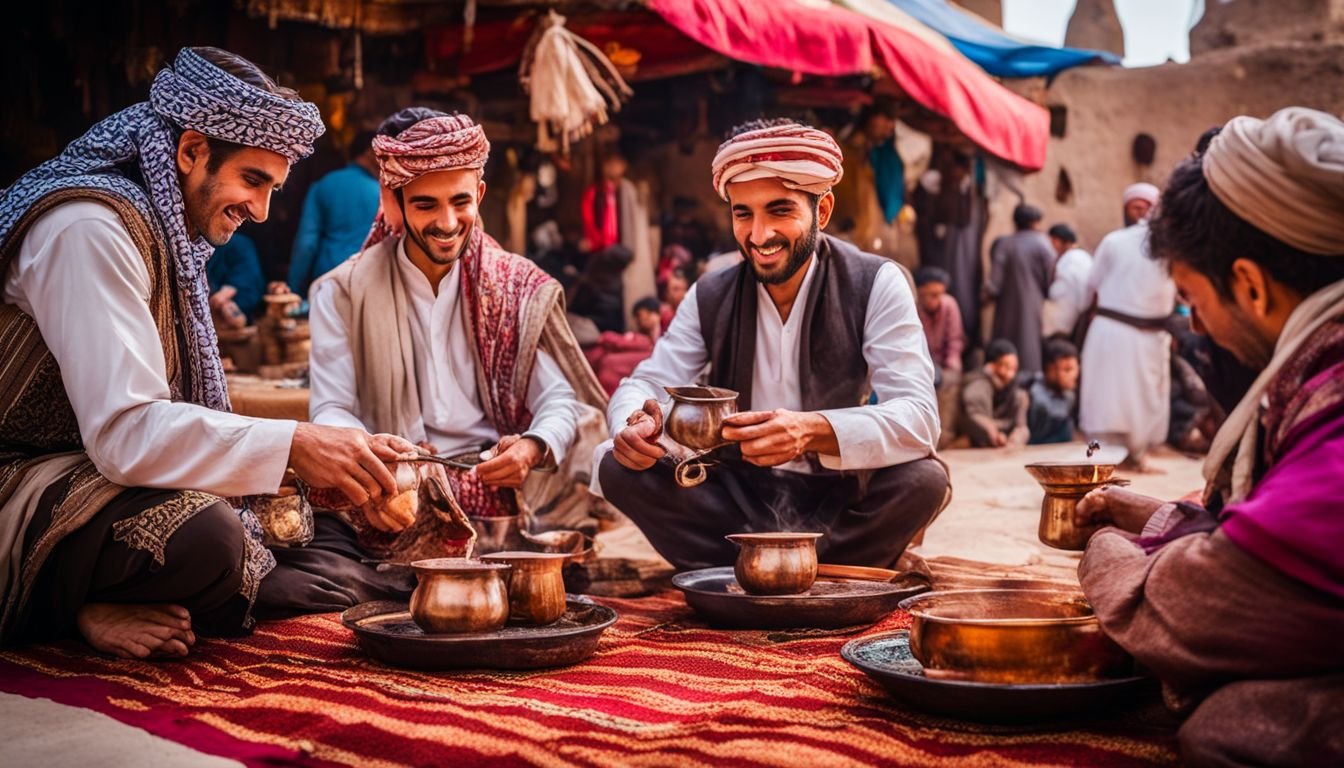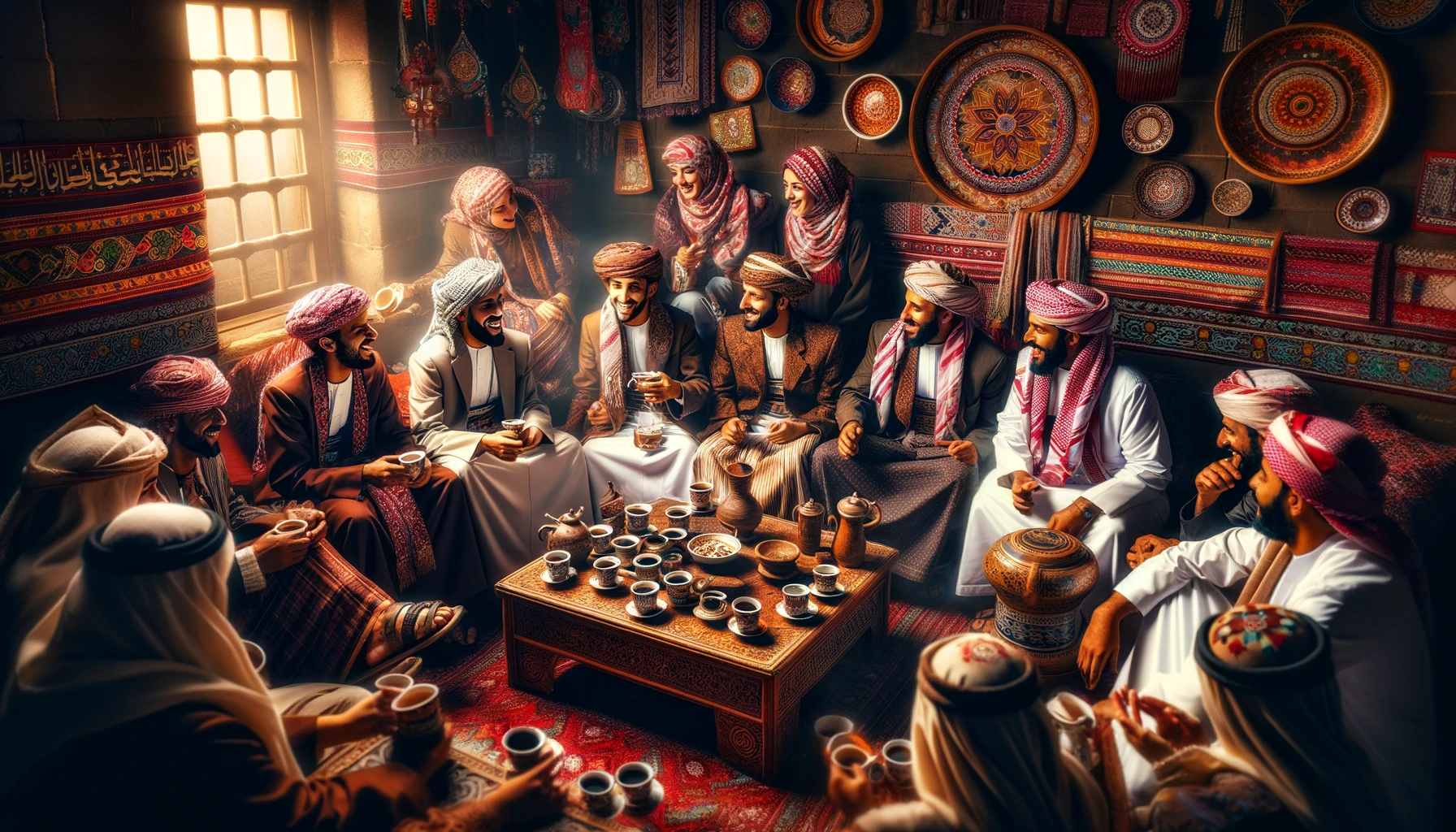Are you curious about the rich coffee culture of Yemen? Yemen has a long history with coffee production, dating back to the 15th century. In this blog, we’ll explore the fascinating traditions and consumption practices of Yemeni coffee, providing insight into its cultural significance and unique flavors. Join us as we take a journey into the world of Yemeni coffee!
Key Takeaways
- Yemen is a historic coffee producer with unique flavors, dating back to the 15th century.
- Coffee holds social and spiritual importance in Yemeni culture through gatherings and traditions.
- Varieties like Mocca Hawari, Mocca Harazi, and Mocca Khulani are part of Yemen’s specialty movement.
- Traditional farming methods without chemicals enhance Yemeni coffee’s distinct taste.
- Despite challenges due to conflict, there is a push to preserve traditional coffee practices.
Brief overview highlighting Yemen’s unique position in the global coffee narrative.
Yemen owns a special place in the world of coffee. It was here, back in the 15th century, that people first brewed coffee and enjoyed its rich flavors. The country’s high-altitude farms produce beans with unique taste profiles that stand out among varieties worldwide.
The historic town of Al-Makha once served as the heart of Yemen’s booming coffee trade. This is where Mocha coffee got its name. For years, Yemen kept a tight grip on its precious crop, not allowing seeds or plants to leave its borders.
Now, Yemeni coffee makes up just a tiny slice of the global market but still holds great importance thanks to traditional farming methods that yield distinct chocolatey notes in every cup.
As we peel back layers of time-honored traditions and dive into social customs around Yemeni brews..
Emphasis on the cultural significance and evolving practices of Yemeni coffee.
Coffee in Yemen is more than just a drink; it’s a vital part of culture and social life. The tradition began with Sufi monks using coffee to stay awake for prayers. Now, it brings people together and is central to hospitality.
Sharing a cup means sharing friendship and respect.
Yemeni coffee practices keep changing, but they never lose their roots. In America, Yemeni-owned coffee shops open their doors wide. Here, everyone can taste the rich brews and learn about Yemen’s past and present values.
These places show that even far from home, coffee continues to connect the Yemeni community.
The Cultural and Social Fabric of Yemeni Coffee

Yemeni coffee plays a central role in social gatherings, fostering community and hospitality through its traditional coffee ceremonies and spiritual significance. To learn more about the cultural and social impact of Yemeni coffee, keep reading!
Exploration of coffee’s role in social gatherings and its contribution to Yemeni community and hospitality.
Coffee takes center stage at Yemeni social gatherings. It’s a time when people come together to share stories, discuss community issues, or just enjoy each other’s company. Serving coffee is an act of hospitality and respect in Yemen.
At these meetings, cups of aromatic brew pass from hand to hand, weaving a tapestry of friendship and trust. Strong bonds form over small sips as the room fills with conversation and laughter.
These gatherings happen often in homes or local coffee shops where tradition blends with the warmth of community spirit. The drink is much more than just caffeine; it’s a symbol of unity and shared heritage among Yemenis everywhere.
Even those far from home find comfort in coffee ceremonies that remind them of their roots and bring them closer to new friends who appreciate this rich cultural practice.
The significance of traditional coffee ceremonies in fostering social and spiritual bonds.
In Yemen, these ceremonies are more than just drinking coffee; they serve as a cornerstone for community life. People come together to share stories and support each other while enjoying their traditional brews.
This ritual is a time-honored practice where elders pass down wisdom to the younger generations, strengthening the fabric of society. Bonds grow stronger over steaming cups of Mocca Hawari or Mocca Harazi, with every sip symbolizing unity and trust among friends and family.
The spiritual side is also vital during these gatherings. They provide moments for reflection and connection beyond the physical world. The shared experience fosters a sense of peace and belonging that resonates deeply within Yemeni heritage.
Through these ceremonies, Yemenis maintain their cultural identity and reinforce social cohesion, proving how integral coffee is in weaving spiritual significance into everyday life.
Distinctive Yemeni Coffee Varieties and Production Techniques
Explore the diverse varieties of Yemeni coffee such as Mocca Hawari, Mocca Harazi, and Mocca Khulani. Discover the traditional farming and sustainable practices that contribute to the unique flavor profiles of Yemeni coffee.
To learn more about the cultural significance and evolving practices of Yemeni coffee, keep reading!
Insight into the diverse varieties of Yemeni coffee such as Mocca Hawari, Mocca Harazi, and Mocca Khulani.
Yemen boasts rich coffee varieties like Mocca Hawari, Mocca Harazi, and Mocca Khulani. These distinct types reflect Yemen’s deep-rooted coffee culture and unique production methods. These are all produced in different growing regions.
Notably, these coffees are part of Yemen’s specialty coffee movement, gaining popularity both locally and internationally.
These diverse Yemeni coffee varieties have garnered attention from the diaspora communities worldwide, contributing to their increased sales. Moreover, local entrepreneurs in Yemen are prioritizing supporting farmers in producing these exceptional coffee types rather than focusing solely on exportation.
Discussion on traditional farming and sustainable practices that contribute to the unique flavor profiles.
Yemeni coffee stands out due to traditional farming methods that prioritize sustainability and quality. Family-owned farms cultivate coffee at higher altitudes on terraced slopes, allowing the beans to develop distinct flavor profiles.
The absence of chemical use in growing methods further enhances the unique characteristics of Yemeni coffee varieties such as Mocca Hawari, Mocca Harazi, and Mocca Khulani. These sustainable practices contribute to richer and more complex aromatic profiles, making Yemeni coffee sought after in international markets.
In addition, traditional farming techniques involve hand-picking the cherries at peak ripeness, ensuring a high-quality harvest with exceptional taste. This meticulous approach to cultivation plays a crucial role in preserving the authenticity and rich heritage of Yemeni coffee culture.
Brewing, Serving, and Enjoying Yemeni Coffee
Learn about the traditional methods for grinding, brewing, and serving Yemeni coffee and discover the cultural nuances of coffee consumption in Yemen. To find out more about this fascinating topic, keep reading!
Detailed exploration of the traditional methods for grinding, brewing, and the etiquette of serving Yemeni coffee.
Yemeni coffee is traditionally ground using a mortar and pestle, meticulously hand-ground until achieving a fine consistency. The brewing process involves simmering the finely ground coffee with water in a special pot called a “jabena,” creating an aromatic concoction.
When serving Yemeni coffee, three cups are customarily presented to each guest, symbolizing hospitality, friendship, and the past, present, and future.
The traditional method of grinding Yemeni coffee dates back centuries and reflects the cultural significance of this beverage. Brewing Qahwa employs meticulous techniques to create a rich flavor that embodies Yemen’s heritage.
The cultural nuances of coffee consumption in Yemen, including qishr (spiced coffee).
Detailing the traditional methods for grinding, brewing, and serving Yemeni coffee provides insight into the cultural nuances of coffee consumption in Yemen. Qishr, an integral part of Yemeni coffee culture, is a unique spiced coffee husk drink that holds significant importance in social and ceremonial practices.
The preparation and enjoyment of qishr showcase the deep-rooted traditions surrounding coffee in Yemen and highlight its spiritual importance within the community.
Yemen’s rich history with qishr reflects its ties to hospitality traditions as it embodies warmth, welcome, and connection among people. This distinctive spiced coffee brings together not only flavors but also individuals, promoting social interactions through shared rituals.
Yemeni Coffee in the Middle East and Beyond
Explore the impact of Yemeni coffee on Middle Eastern coffee culture and its growing presence in international markets. Discover how Yemeni coffee has influenced global brewing traditions and the specialty coffee industry.
Read on to learn more about this cultural phenomenon!
Examination of Yemen’s influence on the Middle Eastern coffee culture and its brewing traditions.
Yemen’s influence on Middle Eastern coffee culture is profound. Its unique Mocca varieties have shaped the region’s coffee preferences for centuries, with distinct brewing techniques passed down through generations.
The spiced coffee tradition of qishr further illustrates Yemen’s impact, enriching the Middle Eastern coffee experience with its aromatic and flavorful profile. This cultural exchange has also contributed to the global rise of specialty coffees, showcasing Yemeni flavors and influencing modern brewing trends.
Yemen’s influence extends beyond taste, as it introduced Middle Eastern brewing traditions that emphasize communal enjoyment of richly brewed coffee. This communal ritual fosters social connections, echoing Yemeni coffee’s role as a symbol of hospitality and unity within communities across the region.
The global impact of Yemeni coffee, highlighting its rise in international markets and contribution to the specialty coffee industry.
Yemeni coffee has made waves in international markets, gaining recognition for its unique flavor profiles and traditional production techniques. Its contribution to the specialty coffee industry is significant, with connoisseurs appreciating the complexity and richness of Yemeni coffee varieties such as Mocca Hawari, Mocca Harazi, and Mocca Khulani.
Despite challenges posed by conflict and economic concerns, Yemeni coffee continues to captivate enthusiasts worldwide. The resilience of Yemeni farmers and their commitment to sustainable farming practices have positioned Yemen as a prominent player in the global coffee economy.
The rise of Yemeni specialty beans has been bolstered not only by its historical significance but also by contemporary efforts driven by entrepreneurs like Mokhtar Alkhanshali who worked tirelessly to export specialty beans during challenging times.
Resilience and Heritage: The Symbolism of Yemeni Coffee
Yemeni coffee symbolizes the resilience and heritage of the Yemeni people amidst ongoing conflict, showcasing their dedication to preserving traditional practices and cultural identity.
Read more about the rich history and significance of Yemeni coffee in our blog!
How Yemeni coffee symbolizes the resilience and heritage of the Yemeni people amidst ongoing conflict.
Yemeni coffee embodies the strength and rich history of its people, standing as a testament to resilience amidst conflict. Rooted in tradition dating back to the 15th century, Yemeni coffee has become a symbol of cultural heritage and perseverance.
Despite ongoing struggles, the specialty coffee movement has emerged, with local entrepreneurs supporting farmers and reintroducing quality coffee. By showcasing Yemen’s historical legacy through its distinct coffee culture, the Yemeni people have shown an unwavering determination to preserve their heritage.
The role of coffee in preserving Yemeni culture and its connection to Yemen’s historical legacy.
Coffee stands as the cornerstone of Yemeni culture, intertwining deeply with its historical legacy. Dating back to the 15th century and integral in community interactions, coffee has symbolized piety and connected communities across the Islamic world.
The influence of British colonialism on Yemen’s coffee trade underscores its cultural significance beyond a mere commodity. Today, Yemeni-owned coffee shops in the U.S. serve as hubs for preserving Yemeni heritage and fostering social connectivity for the Diaspora, showcasing how this tradition transcends time and borders.
Moving forward to explore how contemporary challenges affect Yemeni Coffee Culture..
Contemporary Challenges and Future Perspectives
Addressing the modern challenges faced by Yemeni coffee culture, including economic, environmental, and conflict-related issues. Discover how efforts to preserve traditional practices and sustainable farming are shaping the future of Yemeni coffee.
Learn more about the resilience and heritage of Yemeni coffee culture by reading our full blog!
Addressing the modern challenges faced by Yemeni coffee culture, including economic, environmental, and conflict-related issues.
Yemeni coffee culture grapples with economic hardships due to war, compelling many local entrepreneurs to shift focus from exports to support local farmers. The rise in specialty coffee houses aims to reintroduce quality coffee amid a population accustomed to commercial-grade blends.
Additionally, optimistic outlooks exist for local consumption if a durable ceasefire improves the economy and decreases dependency on aid. Yemen’s diaspora communities have played a role in boosting international sales of Yemeni coffee while new ventures foresee potential for Yemen becoming the largest Middle Eastern coffee center.
Environmental challenges also loom large as sustainable farming practices face limitations amidst the conflict. In parallel, global environmental impacts of climate change threaten traditional cultivation techniques and yield stability, further complicating efforts towards preservation and sustainability awareness.
Future outlook for Yemeni coffee, focusing on the efforts to preserve traditional practices and sustainable farming.
Yemeni coffee strives towards preserving age-old customs and sustainable farming methods, amid ongoing challenges. With entrepreneurs championing local coffee shops and supporting farmers, there’s a determined effort to uphold traditional practices and ensure sustainable cultivation methods thrive.
The specialty coffee movement in Yemen spearheads the commitment to elevate quality over commercial-grade consumption, igniting optimism for a flourishing future of Yemeni coffee culture.
Conclusion
In conclusion, the cultural significance and evolving practices of Yemeni coffee are a testament to its resilience and heritage amidst ongoing conflict, making it an integral part of global coffee culture.
To learn more about the unique traditions and consumption practices of Yemeni coffee, keep reading!
Summarization of the integral role of coffee in Yemeni culture and its significance on a global scale.
Yemen’s coffee culture has deep roots, with the country being one of the earliest producers and consumers of coffee globally. The beverage holds a central place in social gatherings and traditional ceremonies, symbolizing hospitality and community ties.
Yemeni coffee’s global significance lies in its historical legacy and distinct flavor profiles that have influenced Middle Eastern brewing traditions and contributed to the specialty coffee industry.
Despite challenges including conflict impact and economic struggles, Yemen continues to preserve its traditional practices while embracing sustainable farming for the future.
Yemeni coffee has historically been tied to resilience, heritage, and cultural preservation amidst ongoing conflicts. With distinctive dry-processing methods contributing to its chocolate notes, Yemeni coffee remains an emblem of the country’s enduring spirit despite economic constraints.
FAQs
1. What is special about Yemen coffee origin?
Yemen coffee origin is unique because it has a rich history, starting with the introduction of coffeehouses and spreading of Mokha around the world.
2. How do people in Yemen traditionally prepare their coffee?
In Yemen, traditional preparation includes careful roasting, precise grinding techniques, and brewing methods that highlight coffee’s flavor complexity.
3. Has modern innovation changed how Yemeni coffee is made?
Yes! While honoring traditions, modern innovations have improved grinding and roasting methods to enhance quality and sustainability practices in Yemen’s coffee culture.
4. Why is preserving Yemen’s coffee culture important?
Preserving Yemen’s coffee culture protects its historical roots and ensures the continuation of traditional ceremonial practices while supporting artisanal production and local communities.
5. What impact does Yemeni society have on global coffee culture?
Yemeni society has shaped global influence through its historical spread of Middle East Coffee Culture; it introduced new flavors and brewing styles to enthusiasts worldwide.
6. What are some challenges facing the future of Yemen’s Coffee Culture?
Challenges include sustaining high-quality bean production amidst evolving trends while tackling environmental impacts and overcoming economic obstacles for stable exportation.






